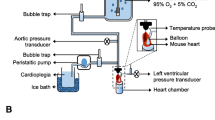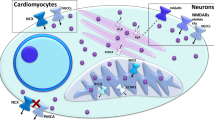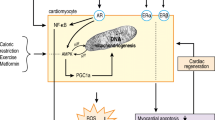Abstract
Cardiac ischemia/reperfusion (I/R) injury is a serious cardiac complication following acute myocardial infarction, which include myocardial infarct size expansion, left ventricular (LV) dysfunction, and fatal cardiac arrhythmias. Sex hormone deprivation due to aging or other pathological conditions is an independent risk factor for cardiovascular disease. Several scientific research studies have been conducted to investigate the role of sex hormones in myocardial injury during cardiac I/R. Testosterone is the primary sex hormone in men; it regulates male sexual characteristics, and controls muscle and bone mass. In addition, testosterone plays an important role in regulating LV function through multiple mechanisms, including those controlling cellular calcium homeostasis, regulating cardiac mitochondrial function and enhancing antioxidants. Findings from studies regarding the roles of testosterone on the heart during cardiac I/R are controversial; some have reported that decreased testosterone level could impair LV function, whilst others reported the benefits of testosterone deprivation during cardiac I/R. In this chapter, we include evidence regarding the effects of testosterone deprivation and exogenous testosterone administration on myocardial injury in terms of myocardial infarct size, LV function, arrhythmias and molecular alterations. Reports from in vitro, ex vivo, in vivo studies, and clinical reports are summarized and discussed. The contents of this chapter will explain the roles of testosterone during cardiac I/R in preventing cardiac complications. Insights from these reports may help to devise strategies to improve treatment in patients with acute myocardial infarction.
Access this chapter
Tax calculation will be finalised at checkout
Purchases are for personal use only
Similar content being viewed by others
References
Benjamin EJ, Virani SS, Callaway CW, Chamberlain AM et al (2018) Heart Disease and Stroke Statistics−2018 Update: A Report From the American Heart Association. Circulation 137:e67–e492
Collins P (2006) Risk factors for cardiovascular disease and hormone therapy in women. Heart 92(Suppl 3):iii24–8
Takawale A, Fan D, Basu R, Shen M et al (2014) Myocardial recovery from ischemia−reperfusion is compromised in the absence of tissue inhibitor of metalloproteinase 4. Circ Heart Fail 7(4):652–662
Ma RC, Tong PC (2010) Testosterone levels and cardiovascular disease. Heart 96(22):1787–1788
Nieschlag E, Nieschlag S (2019) ENDOCRINE HISTORY: The history of discovery, synthesis and development of testosterone for clinical use. Eur J Endocrinol 180(6):R201–R212
Farias JM, Tinetti M, Khoury M, Umpierrez GE (2019) Low testosterone concentration and atherosclerotic disease markers in male patients with type 2 diabetes. J Clin Endocrinol Metab 99(12):4698–4703
Niccoli G, Milardi D, D’Amario D, Fracassi F et al (2015) Hypotestosteronemia is frequent in ST−elevation myocardial infarction patients and is associated with coronary microvascular obstruction. Eur J Prev Cardiol 22(7):855–863
Apaiajai N, Chunchai T, Jaiwongkam T, Kerdphoo S et al (2018) Testosterone Deprivation Aggravates Left−Ventricular Dysfunction in Male Obese Insulin−Resistant Rats via Impairing Cardiac Mitochondrial Function and Dynamics Proteins. Gerontology 64(4):333–343
Pongkan W, Pintana H, Sivasinprasasn S, Jaiwongkam T et al (2016) Testosterone deprivation accelerates cardiac dysfunction in obese male rats. J Endocrinol 229(3):209–220
Pongkan W, Pintana H, Jaiwongkam T, Kredphoo S et al (2016) Vildagliptin reduces cardiac ischemic−reperfusion injury in obese orchiectomized rats. J Endocrinol 231(1):81–95
Arinno A, Apaijai N, Kaewtep P, Pratchayasakul W, et al (2019) Combined low−dose testosterone and vildagliptin confers cardioprotection in castrated obese rats. J Endocrinol (in press)
Osterberg EC, Bernie AM, Ramasamy R (2014) Risks of testosterone replacement therapy in men. Indian J Urol 30(1):2–7
Goodale T, Sadhu A, Petak S, Robbins R (2017) Testosterone and the Heart. Methodist Debakey Cardiovasc J 13(2):68–72
Seftel AD, Kathrins M, Niederberger C (2015) Critical Update of the 2010 Endocrine Society Clinical Practice Guidelines for Male Hypogonadism: A Systematic Analysis. Mayo Clin Proc 90(8):1104–1115
Palee S, McSweeney CM, Maneechote C, Moisescu DM, et al (2019) PCSK9 inhibitor improves cardiac function and reduces infarct size in rats with ischaemia/reperfusion injury: Benefits beyond lipid−lowering effects. J Cell Mol Med (in press)
Maneechote C, Palee S, Kerdphoo S, Jaiwongkam T et al (2019) Balancing mitochondrial dynamics via increasing mitochondrial fusion attenuates infarct size and left ventricular dysfunction in rats with cardiac ischemia/reperfusion injury. Clin Sci (Lond) 133(3):497–513
Apaijai N, Chinda K, Palee S, Chattipakorn S et al (2014) Combined vildagliptin and metformin exert better cardioprotection than monotherapy against ischemia−reperfusion injury in obese−insulin resistant rats. PLoS ONE 9(7):e102374
Lindsey ML, Bolli R, Canty JM Jr, Du XJ et al (2018) Guidelines for experimental models of myocardial ischemia and infarction. Am J Physiol Heart Circ Physiol 314(4):H812–H838
Borst SE, Quindry JC, Yarrow JF, Conover CF et al (2010) Testosterone administration induces protection against global myocardial ischemia. Horm Metab Res 42(2):122–129
Callies F, Stromer H, Schwinger RH, Bolck B et al (2003) Administration of testosterone is associated with a reduced susceptibility to myocardial ischemia. Endocrinology 144(10):4478–4483
Liu J, Tsang S, Wong TM (2006) Testosterone is required for delayed cardioprotection and enhanced heat shock protein 70 expression induced by preconditioning. Endocrinology 147(10):4569–4577
Rubio−Gayosso I, Ramirez−Sanchez I, Ita−Islas I, Ortiz−Vilchis P et al (2013) Testosterone metabolites mediate its effects on myocardial damage induced by ischemia/reperfusion in male Wistar rats. Steroids 78(3):362–369
Tsang S, Wu S, Liu J, Wong TM (2008) Testosterone protects rat hearts against ischaemic insults by enhancing the effects of alpha(1)−adrenoceptor stimulation. Br J Pharmacol 153(4):693–709
Ghimire A, Bisset ES, Howlett SE (2019) Ischemia and reperfusion injury following cardioplegic arrest is attenuated by age and testosterone deficiency in male but not female mice. Biol Sex Differ 10(1):42
Hadi NR, Yusif FG, Yousif M, Jaen KK (2014) Both castration and goserelin acetate ameliorate myocardial ischemia reperfusion injury and apoptosis in male rats. ISRN Pharmacol 2014:206951
Huang C, Gu H, Zhang W, Herrmann JL et al (2010) Testosterone−down−regulated Akt pathway during cardiac ischemia/reperfusion: a mechanism involving BAD, Bcl−2 and FOXO3a. J Surg Res 164(1):e1−11
Kohno H, Takahashi N, Shinohara T, Ooie T et al (2007) Receptor−mediated suppression of cardiac heat−shock protein 72 expression by testosterone in male rat heart. Endocrinology 148(7):3148–3155
Le TY, Ashton AW, Mardini M, Stanton PG et al (2014) Role of androgens in sex differences in cardiac damage during myocardial infarction. Endocrinology 155(2):568–575
Nam UH, Wang M, Crisostomo PR, Markel TA et al (2007) The effect of chronic exogenous androgen on myocardial function following acute ischemia−reperfusion in hosts with different baseline levels of sex steroids. J Surg Res 142(1):113–118
Pavon N, Martinez−Abundis E, Hernandez L, Gallardo−Perez JC, et al (2012) Sexual hormones: effects on cardiac and mitochondrial activity after ischemia−reperfusion in adult rats. Gender difference. J Steroid Biochem Mol Biol 132(1–2):135–46
Wang M, Tsai BM, Kher A, Baker LB et al (2005) Role of endogenous testosterone in myocardial proinflammatory and proapoptotic signaling after acute ischemia−reperfusion. Am J Physiol Heart Circ Physiol 288(1):H221–H226
Wang M, Wang Y, Abarbanell A, Tan J et al (2009) Both endogenous and exogenous testosterone decrease myocardial STAT3 activation and SOCS3 expression after acute ischemia and reperfusion. Surgery 146(2):138–144
O’Rourke B, Van Eyk JE, Foster DB (2011) Mitochondrial protein phosphorylation as a regulatory modality: implications for mitochondrial dysfunction in heart failure. Congest Heart Fail 17(6):269–282
Bertero E, Maack C (2018) Calcium Signaling and Reactive Oxygen Species in Mitochondria. Circ Res 122(10):1460–1478
Pongkan W, Chattipakorn SC, Chattipakorn N (2015) Chronic testosterone replacement exerts cardioprotection against cardiac ischemia−reperfusion injury by attenuating mitochondrial dysfunction in testosterone−deprived rats. PLoS ONE 10(3):e0122503
Svartberg J (2007) Epidemiology: testosterone and the metabolic syndrome. Int J Impot Res 19(2):124–128
Donner DG, Elliott GE, Beck BR, Bulmer AC et al (2015) Impact of Diet−Induced Obesity and Testosterone Deficiency on the Cardiovascular System: A Novel Rodent Model Representative of Males with Testosterone−Deficient Metabolic Syndrome (TDMetS). PLoS ONE 10(9):e0138019
Alexandre J, Milliez P, Rouet R, Manrique A et al (2015) Aldosterone and testosterone: two steroid hormones structurally related but with opposite electrophysiological properties during myocardial ischemia−reperfusion. Fundam Clin Pharmacol 29(4):341–351
Lauro FV, Francisco DC, Elodia GC, Eduardo PG et al (2014) Activity exerted by a testosterone derivative on myocardial injury using an ischemia/reperfusion model. Biomed Res Int 2014:217865
Kuhar P, Lunder M, Drevensek G (2007) The role of gender and sex hormones in ischemic−reperfusion injury in isolated rat hearts. Eur J Pharmacol 561(1–3):151–159
Seara FAC, Barbosa RAQ, de Oliveira DF, Gran da Silva DLS, et al (2017) Administration of anabolic steroid during adolescence induces long−term cardiac hypertrophy and increases susceptibility to ischemia/reperfusion injury in adult Wistar rats. J Steroid Biochem Mol Biol 171: 34–42
Maldonado O, Ramos A, Guapillo M, Rivera J, et al (2019) Effects of chronic inhibition of Testosterone metabolism on cardiac remodeling after ischemia/reperfusion−induced myocardial damage in gonadectomized rats. Biol Open 8(5)
Seara FAC, Barbosa RAQ, Santos MVN, Domingos AE et al (2019) Paradoxical effect of testosterone supplementation therapy on cardiac ischemia/reperfusion injury in aged rats. J Steroid Biochem Mol Biol 191:105335
Cole AP, Hanske J, Jiang W, Kwon NK et al (2018) Impact of testosterone replacement therapy on thromboembolism, heart disease and obstructive sleep apnoea in men. BJU Int 121(5):811–818
Oni OA, Sharma R, Chen G, Sharma M et al (2017) Normalization of testosterone levels after testosterone replacement therapy is not associated with reduced myocardial infarction in smokers. Mayo Clin Proc Innov Qual Outcomes 1(1):57–66
Li H, Mitchell L, Zhang X, Heiselman D et al (2017) Testosterone Therapy and Risk of Acute Myocardial Infarction in Hypogonadal Men: An Administrative Health Care Claims Study. J Sex Med 14(11):1307–1317
Sharma R, Oni OA, Gupta K, Chen G et al (2015) Normalization of testosterone level is associated with reduced incidence of myocardial infarction and mortality in men. Eur Heart J 36(40):2706–2715
Anderson JL, May HT, Lappé DL, Bair T et al (2016) Impact of testosterone replacement therapy on myocardial infarction, stroke, and death in men with low testosterone concentrations in an integrated health care system. Am J Cardiol 117(5):794–799
Budoff MJ, Ellenberg SS, Lewis CE, Mohler ER 3rd et al (2017) Testosterone treatment and coronary artery plaque volume in older men with low testosterone. JAMA 317(7):708–716
Mathur A, Malkin C, Saeed B, Muthusamy R et al (2009) Long−term benefits of testosterone replacement therapy on angina threshold and atheroma in men. Eur J Endocrinol 161(3):443–449
Malkin CJ, Pugh PJ, Morris PD, Kerry KE et al (2004) Testosterone replacement in hypogonadal men with angina improves ischaemic threshold and quality of life. Heart 90(8):871–876
Malkin CJ, Morris PD, Pugh PJ, English KM et al (2003) Effect of testosterone therapy on QT dispersion in men with heart failure. Am J Cardiol 92(10):1241–1243
Etminan M, Skeldon SC, Goldenberg SL, Carleton B, et al. Testosterone therapy and risk of myocardial infarction: a pharmacoepidemiologic study. Pharmacotherapy 35(1):72–8
Acknowledgments
This work was supported by grants from Thailand Research Fund (NA: TRG6280005), the Senior Research Scholar grant from the National Research Council of Thailand (SCC), a NSTDA research chair grant from the National Development Agency of Thailand (NC), and the Chiang Mai University Center of Excellence Award (NC).
Author information
Authors and Affiliations
Corresponding author
Editor information
Editors and Affiliations
Rights and permissions
Copyright information
© 2020 Springer Nature Switzerland AG
About this chapter
Cite this chapter
Apaijai, N., Chattipakorn, S.C., Chattipakorn, N. (2020). The Roles of Testosterone in Cardiac Ischemia/Reperfusion Injury. In: Ostadal, B., Dhalla, N.S. (eds) Sex Differences in Heart Disease. Advances in Biochemistry in Health and Disease, vol 21. Springer, Cham. https://doi.org/10.1007/978-3-030-58677-5_3
Download citation
DOI: https://doi.org/10.1007/978-3-030-58677-5_3
Published:
Publisher Name: Springer, Cham
Print ISBN: 978-3-030-58676-8
Online ISBN: 978-3-030-58677-5
eBook Packages: Biomedical and Life SciencesBiomedical and Life Sciences (R0)




